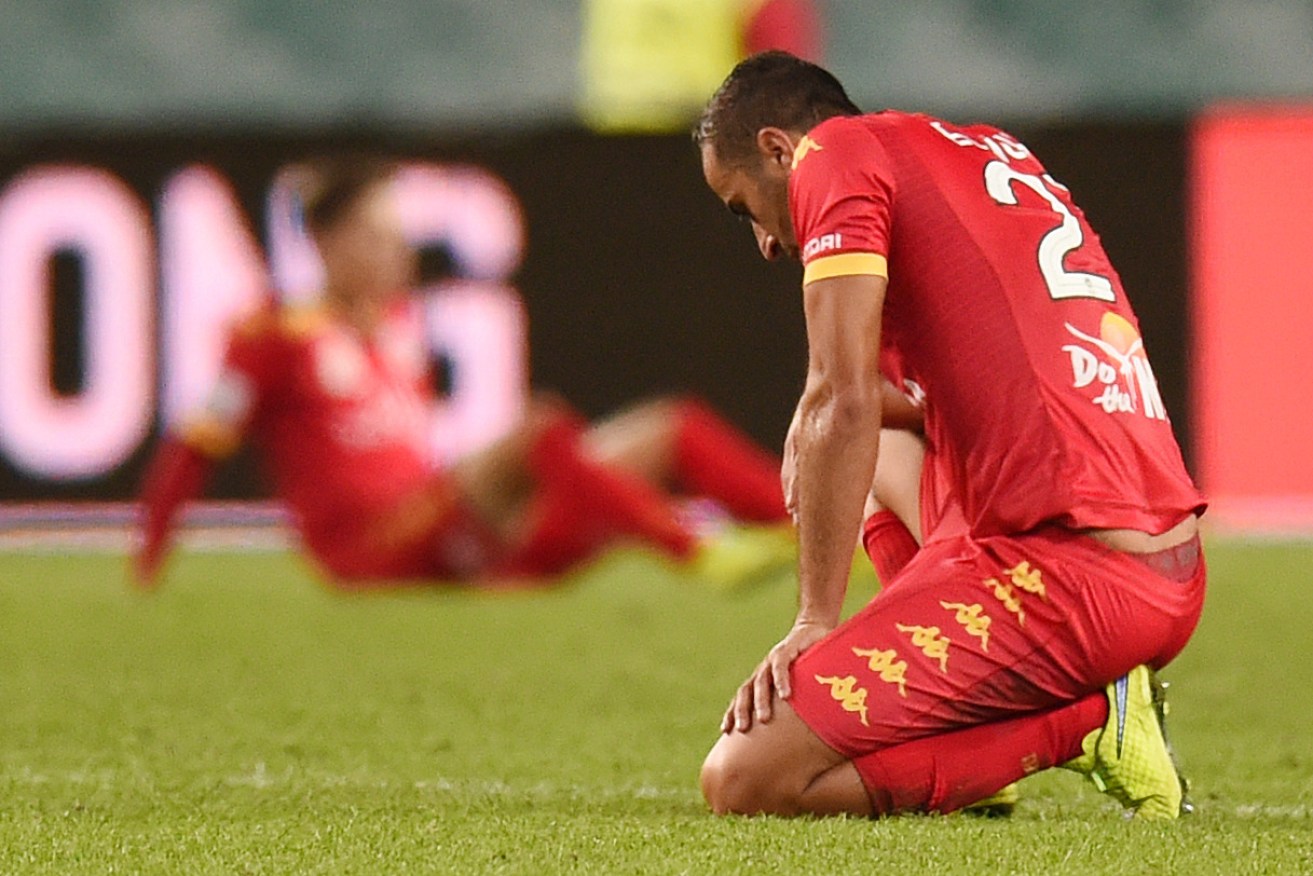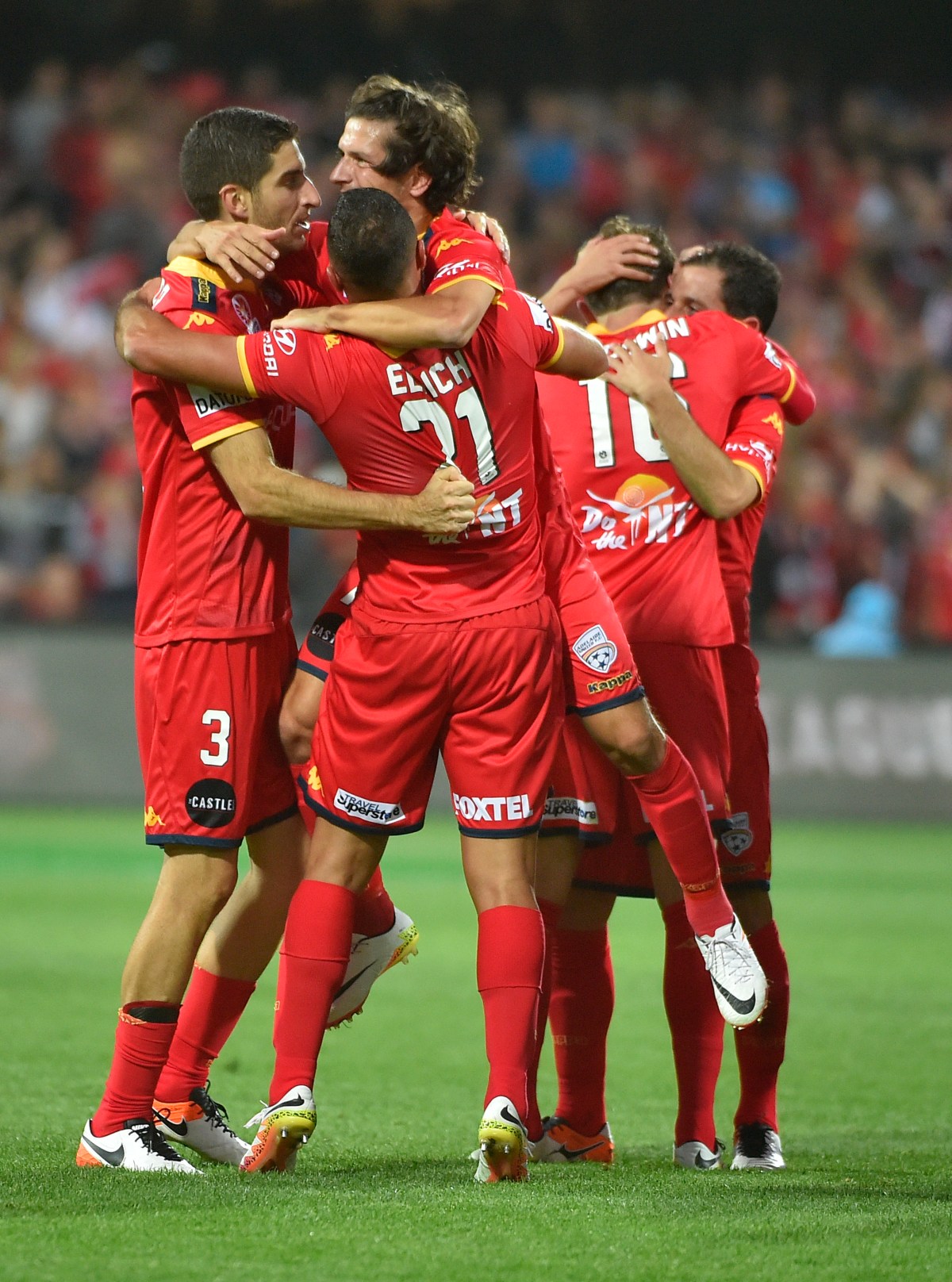From rudderless losers, to writing one of Manton Street’s greatest tales
Hindsight is a strange and wonderful thing. It allows us to recognise that United were, for much of the season just gone, in a league of their own. So why did it so often feel as though they were chasing the pack? Paul Marcuccitti reflects on the Reds’ finest chapter.

FROM THIS: This time last year Adelaide United's breakthrough championship seemed a world away. Photo: Dean Lewins, AAP.
A fairy tale. A miracle. Unprecedented…
And I’m not even talking about Adelaide United winning the championship after its eight match winless start.
It’s that the team got our hopes up yet again – it does almost every year – but finally ended the campaign with that elusive title.

TO THIS: United players celebrate last week’s A-League Grand Final win. Photo: David Mariuz, AAP.
The 2015-16 season was United’s twelfth (having played in the last edition of the National Soccer League and all eleven A-League seasons). The Reds have reached the finals series nine times.
It’s tempting to try to find an explanation for this success and contrast it with all the near misses that preceded it. Was there something about this team that previous squads didn’t have? Were there fewer standout opponents? Did a little more luck fall the Reds’ way?
But invariably many elements combine and we can argue about which were more important.
Throughout the season, I’ve used several facts and figures to try to help examine what was and wasn’t working. Not because they justify or explain everything but because they add to the conversation.
Perhaps some of those measures weren’t the most useful. I’ve been quick to disparage others overstating the importance of certain statistics; you might throw the same criticism at me.
Nevertheless we mostly agree that wins and losses matter.
[I say mostly because I acknowledge those occasional attractive-football-versus-winning-football arguments. But I won’t entertain any idea that results aren’t important until championships are handed to teams on the basis of how many points judges award them for artistic merit.]
What then would you say about a team that, from 21 matches, recorded 16 wins, 4 draws and just 1 loss?
Dominant. In a league of its own. Perhaps you’d even see it as a sign of a competition’s unevenness.
Some of you have probably already registered that that’s Adelaide United’s record since round 8 (including finals).
Yet it never really felt like the Reds were so far ahead of their rivals.
No doubt the results carried from those ghastly opening eight matches diluted any idea that United was utterly supreme.
But then the manner of the wins deceived as well. Some of them were tight affairs: the last-minute goals against Sydney at home in December and away to Melbourne Victory in February; the late rally needed against Central Coast (!) at Hindmarsh in January.
United could even make big wins look relatively ordinary. The 3-0 triumph over Wellington on Boxing Day springs to mind. Even January’s deserved 4-1 win in Brisbane felt more like a smash-and-grab victory than an annihilation.
This isn’t a criticism; in fact, it’s the highest compliment. The squad maximised its effectiveness. It had adaptability and character.
And frankly these are epithets I didn’t think I’d be using. As far back as last season I identified three shortcomings that stood between the Reds and a title. One was that they regularly gave up leads. Goodness, how emphatically that problem was eliminated.
It was partly fixed by the players’ endeavour but the flexibility they showed, that ability to respond to changing patterns in games, was an essential component of The Turnaround™.
United could even make big wins look relatively ordinary. This isn’t a criticism; it’s the highest compliment.
And I promise I won’t mention this next subject for at least another week: the folly of high possession football.
Actually it’s been an awful twelve months for possession zealots. Leaving aside The Reds’ rapid improvement after they stopped trying to play keep-ball, on one of the sport’s biggest stages, Leicester City completed a most unlikely triumph despite having the Premier League’s third-lowest possession average. Similarly, unfancied Atlético Madrid has reached the final of the UEFA Champions League (knocking Barcelona out along the way) even though it regularly allows opponents to have more of the ball.
How liberating it must have been for United’s defenders to know that, when under pressure, they didn’t have to find a teammate and booting the ball upfield or out of play was perfectly acceptable. In the aforementioned 21 matches, they only conceded 13 times.
One thing I was wrong about was the need to sign a regular goal scorer. Teams rarely succeed in the A-League without having a player reach double figures in the home-and-away rounds but United did just that.
Goals were shared around so much that there were eight different players with at least three for the season (no other club had more than six players who scored three or more). Other than ‘keeper Eugene Galekovic, Iacopo La Rocca was the only member of United’s grand final starting eleven who didn’t find the back of the net in 2015/16.
The distribution of goals was somewhat appropriate because this was a story that wasn’t dominated by one or two heroes. Had, for example, Melbourne City won the title, we’d be talking about Aaron Mooy and Bruno Fornaroli and… Aaron Mooy and Bruno Fornaroli.
Instead we’ll remember all our contributors and the way they went from rudderless losers to dogged winners to stylish champions.
They’ve written one of Manton Street’s greatest ever tales; one we’ll be recounting many years from now.
Paul Marcuccitti is a co-presenter of 5RTI’s Soccer on 531 program which can be heard from 10am on Saturdays. Manton St Tales will return next season.




